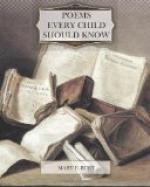God of our fathers, known of old—
Lord of our far-flung battle-line—
Beneath whose awful Hand we hold
Dominion over palm and pine—
Lord God of Hosts, be with us yet,
Lest we forget—lest we forget!
The tumult and the shouting dies—
The captains and the kings depart—
Still stands Thine ancient Sacrifice,
An humble and a contrite heart.
Lord God of Hosts, be with us yet,
Lest we forget—lest we forget!
Far-called our navies melt
away—
On dune and headland
sinks the fire—
Lo, all our pomp of yesterday
Is one with Nineveh
and Tyre!
Judge of the Nations, spare
us yet,
Lest we forget—lest
we forget!
If, drunk with sight of power,
we loose
Wild tongues that
have not Thee in awe—
Such boasting as the Gentiles
use
Or lesser breeds
without the Law—
Lord God of Hosts, be with
us yet,
Lest we forget—lest
we forget!
For heathen heart that puts
her trust
In reeking tube
and iron shard—
All valiant dust that builds
on dust,
And guarding calls
not Thee to guard—
For frantic boast and foolish
word,
Thy mercy on Thy People, Lord!
Amen.
RUDYARD KIPLING.
OZYMANDIAS OF EGYPT.
“Ozymandias of Egypt,” by Percy Bysshe Shelley (1792-1822). This sonnet is a rebuke to the insolent pride of kings and empires. It is extremely picturesque. It finds a place here because more elderly scholars of good judgment are pleased with it. I remember an old gray-haired scholar in Chicago who often recited it to his friends merely because it touched his fancy.
I met a traveller from an
antique land
Who said: “Two
vast and trunkless legs of stone
Stand in the desert.
Near them on the sand,
Half sunk, a shattered visage
lies, whose frown
And wrinkled lip and sneer
of cold command
Tell that its sculptor well
those passions read
Which yet survive, stamped
on these lifeless things,
The hand that mock’d
them and the heart that fed;
And on the pedestal these
words appear:
’My name is Ozymandias, king
of kings:
Look on my works, ye Mighty,
and despair!’
Nothing beside remains.
Round the decay
Of that colossal wreck, boundless
and bare,
The lone and level sands stretch
far away;”
PERCY BYSSHE SHELLEY.
MORTALITY.
“Mortality” (by William Knox, 1789-1825) is always quoted as Lincoln’s favourite poem.
O why should the spirit of
mortal be proud?
Like a fast-flitting meteor,
a fast-flying cloud,
A flash of the lightning,
a break of the wave,
He passes from life to his
rest in the grave.
The leaves of the oak and
the willow shall fade,
Be scattered around and together
be laid;
And the young and the old,
and the low and the high,
Shall moulder to dust and
together shall lie.




